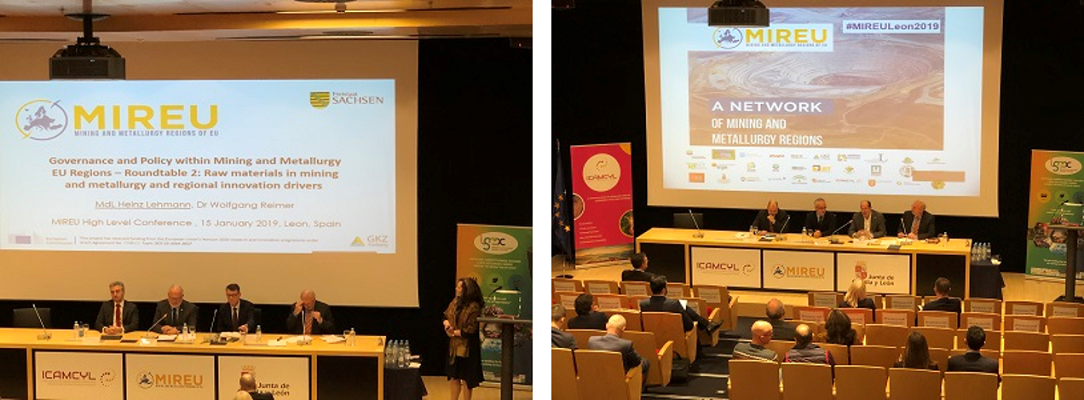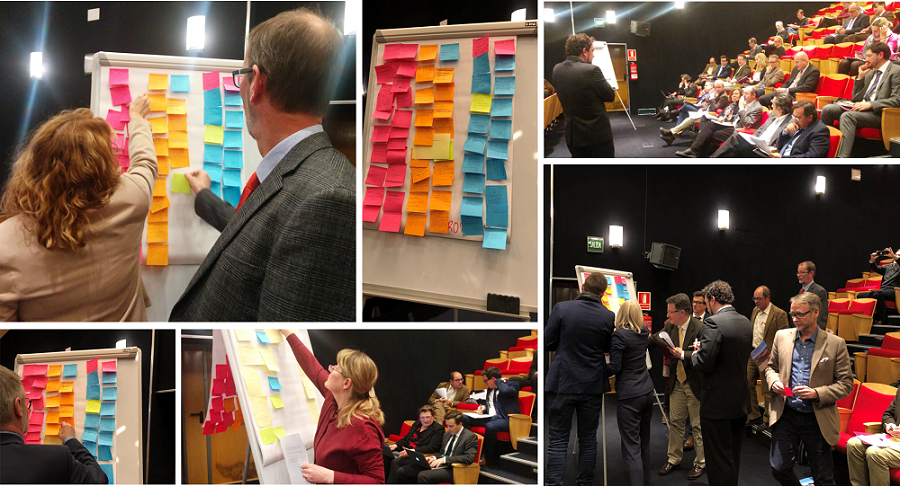ICAMCyL hosted a successful high-level meeting on “Governance and Policy within Mining and Metallurgy EU Regions”
Icamcyl in the media / 18-01-2019As part of the MIREU project, ICAMCyL hosted in January a high-level meeting on ‘Governance and Policy within Mining and Metallurgy EU Regions’. This meeting brought together authorities and experts in the field of raw materials and mining from 17 European regions and 14 European countries to discuss the future of mining and metallurgy in Europe. The conclusions of the workshop will soon be put together in a roadmap that will be later submitted to the EU Parliament to convey a unified message on the future of the mining industry in Europe.
The workshop kicked off with a welcome message from the Mayor of León, Antonio Silva, followed by interventions from the Governor of Lapland, Mika Riipi, the President of the Province of León, Juan Martínez Majo, the General Director for Energy and Mining of the Regional Government of Castilla y León, Ricardo González Mantero, and the General Director of ICAMCyL, Santiago Cuesta. Both Silva and Riipi highlighted the importance of the extractive industry in their regions and the need for a closer collaboration between European mining regions.
The following session started with an intervention from the European Commission over Skype, where Nikos Pantalos from DG GROW presented the S3 Platform on Industrial Modernisation. Pantalos emphasised the importance of regional collaboration in order to modernise the industry, learn from each other and foster investment. Karen Hanghøj, Director of EIT Raw Materials, emphasized the relevance of entrepeneurship and the role of SMEs in a 21st century sustainable mining sector for Europe, while Lisanne Raderschall from the OECD gave an overview of the OECD global network of mining regions and cities.
Image: Attendees to the meeting (left); Karen Hanghøj, director of EIT Raw Materials (right).
A series of roundtable sessions followed, where different representatives of the participating regions led discussions on topics of relevance to the mining and metallurgy industries. This session focused on topics such as European raw materials policies; key regional innovation drivers for sustainable mining; and main barriers for the mining sector. Two key factors for ensuring the sustainable development of the European mining and metallurgy industries emerged from the discussions: communication and collaboration. All regional representatives found that clear information and communication with society is imperative for the mining industry. This includes both information on raw materials and their importance as well as communication of good examples, such as those mines with high social and environmental standards. Another key factor is collaboration between mining regions, which enables them to learn from each other’s experiences and to share knowledge.
Three megatrends were also emphasised: globalisation and the need for all the Europeans regions to make a common cause in order to be globally competitive; the need to coordinate and create links on economic and environmental politics; and the application of the latest advances in robotics, digitalization and automation to the mining sector.
Image: Roundtable sessions at the event.
An important part of the high-level workshop was the interactive session, led by Santiago Cuesta, general manager at ICAMCyL, where all workshop participants brainstormed together on the barriers and problems in the European raw materials industry, and possible solutions to overcome them. These barriers, problems and solutions were written down by the participants on post-its and will constitute the basis for the document that will be later submitted to the EU institutions.
Image: Attendees participated in this interactive session on best practices, barriers and opportunities for the raw materials, mining and metallurgy sectors in Europe.
The workshop came to an end with a session where a number of short presentations where presented accounting for different EU initiatives and projects on raw materials, mining and metallurgy. All in all, this high-level meeting was an excellent occasion for experts and authorities from all over Europe to share experiences, knowledge, concerns and future actions, and also to contribute to strengthening the collaboration between the regions.


